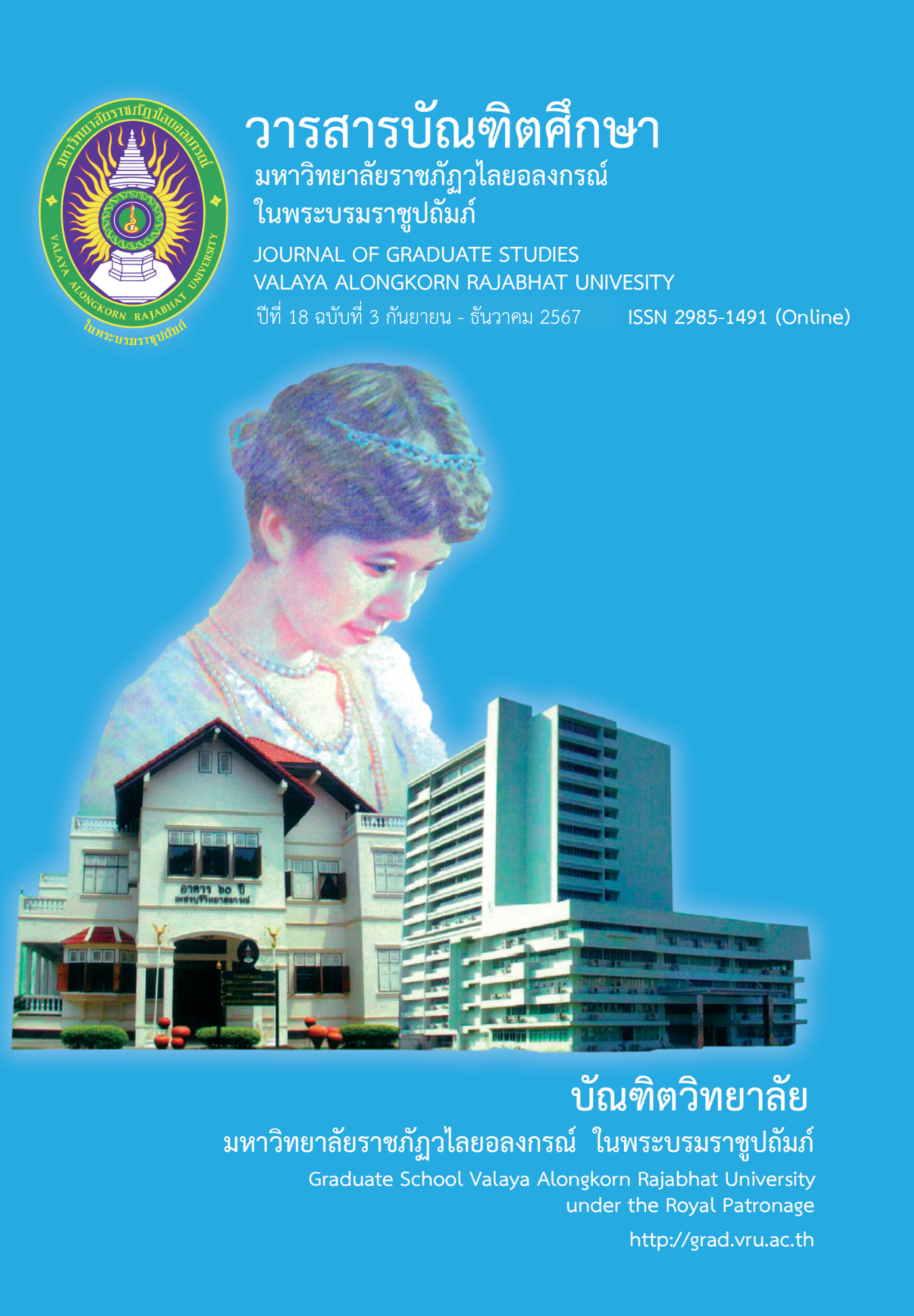THE IMPACT OF UTILIZING HANDMADE INSTRUCTIONAL MEDIA COMBINED WITH QUESTION–BASED–LEARNING IN THE CONTEXT OF DECIMALS ON ACADEMIC ACHIEVEMENT AND SATISFACTION OF SEVENTH-GRADE STUDENTS
Main Article Content
Abstract
The objectives of this research were to 1) develop handmade instructional media in mathematics for seventh-grade students, specifically focusing on the topic of decimals, aiming to meet the effectiveness criterion of 80/80, 2) compare the learning outcomes of seventh-grade students between traditional learning classes and those using handmade instructional media combined with question-based learning in the context of decimals, and 3) assess the satisfaction levels of seventh-grade students using handmade instructional media combined with question-based learning. The sample group used in the research consisted of seventh-grade students during the academic year 2023, totaling 160 students, selected through cluster random sampling, divided into an experimental group of 80 students and a control group of 80 students. Research tools included handmade instructional media 8topics, learning management plans using handmade instructional media combined with question-based learning 10 plans, normal learning management plans 10 plans, an achievement test, and a satisfaction assessment tool. Data analysis employed statistical measures such as mean, percentage, standard deviation, and an independent t-test for hypothesis testing.
The results indicated 1) The effectiveness of the handmade instructional media in mathematics on the topic of decimals at 83.33/81.72, 2) the students using the handmade instructional media combined with Question-Based-Learning exhibited higher learning achievement scores compared to those in traditional learning classes, with significance at the .05 level. Moreover, and 3) the satisfaction level of seventh-grade students with the handmade instructional media combined with Question-Based-Learning was notably high ( = 4.80, SD = 0.25).
Article Details

This work is licensed under a Creative Commons Attribution-NonCommercial-NoDerivatives 4.0 International License.
บทความทุกเรื่องได้รับการตรวจความถูกต้องทางวิชาการโดยผู้ทรงคุณวุฒิ ทรรศนะและข้อคิดเห็นในบทความ Journal of Global of Perspectives in Humanities and Social Sciences (J-GPHSS) มิใช่เป็นทรรศนะและความคิดของผู้จัดทำจึงมิใช่ความรับผิดชอบของบัณฑิตวิทยาลัย มหาวิทยาลัยราชภัฏวไลยอลงกรณ์ ในพระบรมราชูปถัมภ์ กองบรรณาธิการไม่สงวนสิทธิ์การคัดลอก แต่ให้อ้างอิงแหล่งที่มา
References
Bureau of Academic Affairs and Education Standard. (2005). khanittasāt samkhan yāngrai [How important is mathematics?]. Retrieved from https://academic.obec.go.th/web/official/view/14
Butsrimuang, K. (2022). phon kānčhat kitčhakam kānrīanrū dōi nēn kān khit bǣp hi wari satirawa bǭkānchai kham thām plāi pœ̄t thī mī tǭ phon samrit thāngkān rīan læ khwāmsāmāt nai kānhai hētphon thāng khanittasāt rư̄ang ʻattrāsūan læ rǭila khō̜ng nak rīan chan prathom sưksā pī thī hok [Effect of Learning Activity Management Emphasized Heuristics Thinking Method with Open-Ended Questions on Mathematical Achievement and Reasoning Ability on Ratio and Percentage of Prathomsuksa 6 Students]. Master's thesis. Mahasarakham University.
Chatmaneerungcharoen, S. (2020). nǣokhit kān thām kham thām [concept of asking questions]. Journal of Education Khon Kaen University. 43(2), 43-58. Retrieved from https://so02.tci- thaijo.org/index.php/EDKKUJ/article/view/242149
Fakplung, A. (2021). kānphatthanā kēm kānsưksā dōi chai sư̄ čhāk thammachāt phư̄a songsœ̄m thaksa phư̄nthān thāng khanittasāt samrap nak rīan nǭ nu bān pī thī song [The development of learning educational games with natural objects to stimulate mathematics basic skills for kindergarten 2 students]. Master's thesis. Naresuan University.
Fang. (2013). sư̄ kānsǭn tham mư̄ vs sư̄ theknōlōyī [Handmade instruction media vs technology media]. Retrieved from https://fangkatiistory.blogspot.com/2013/01/vs-ormal-0-false-false-false-en-us-x.html
Khamsrichan, W. (2013). sư̄ rīanrū tham mư̄ phư̄a khun khrū khō̜ng khon khāt ʻōkāt nai chonnabot [Handmade instruction media for teachers of underprivileged people in rural areas]. Retrieved from https://www.gotoknow.org/posts/217140
Maslow, A. (2020). A Theory of Human Motivation. HN Publishing.
Mongkolwanit, P. (2015). Question-Based-Learning. Retrieved from https://personality-development-stc.blogspot.com/2015/07/question-based-learning-qbl.html
Phunthukulratana, N. (2015). kānčhatkān rīanrū bǣp chai kham thām [Question-based learning management]. Retrieved from https://navapolguide7.blogspot.com/2015/07/questioning-method.html
Piyawong, R. (2016). kānsưksā phon samrit thāngkān rīan wichā khanittasāt dōi chai chut kān rīan kānsǭn rư̄ang khwāmsamphan rawāng rūp rēkhākhanit sǭng miti læ sām miti khō̜ng nak rīan namat yom sưksā pī thī nưng rōngrīan badi not ra dē chā (sing singha sēnī) sī dōi withīkān rīan bǣp rūammư̄ theknik STAD [A study of academic achievement in mathematics Using a teaching set on the relationship between two-dimensional and three-dimensional geometric figures of Mathayom 1 students at Bodindecha (Sing Singhaseni) School 4 by means of cooperative learning using the STAD technique]. Master's thesis. Ramkhamhaeng University.
Promwong, C. (2013). kānthotsǭp prasitthiphāp sư̄ rư̄ chut kānsǭn [Testing the effectiveness of media or teaching materials]. Journal of Silpakorn Educational Research. 5(1), 7-20. Retrieved from https://so05.tci-thaijo.org/index.php/suedureasearchjournal/article/view/28419
Registration and Evaluation. (2022). bǣp rāingān sarup phon samrit thāngkān rīan pīkānsưksā sǭngphanhārǭihoksiphā [Academic achievement summary report form, academic year 2022]. Retrieved from http://110.164.191.222/~t221/registra/#
Sitthikaeo, P. & Yaemsaeng, N. (2018). phon kānčhat kitčhakam kānrīanrū khanittasāt rư̄ang phư̄nthī phiu læ parimāt tām thritsadī khō̜n sot khati wi sưm namat yom sưksā pī thī sām rōngrīan sāthit Mahāwitthayālai Rāmkhamhǣng [Results of mathematics learning activities on surface area and volume according to constructivism theory. Mathayom 3, Ramkhamhaeng University Demonstration School]. Journal of Education Naresuan University. 23(2), 232-244. Retrieved from https://so06.tci-thaijo.org/index.php/edujournal_nu/article/view/117657
Tumtong, D. (2014). panhā kot ʻaya ʻōkāt thāngkān sưksā [Problems of underprivileged student in education]. Journal of Faculty of Humanities and Social Sciences Academic. 10(1), 123-141. Retrieved from https://so03.tci-thaijo.org/index.php/eJHUSO/article/view/85712


